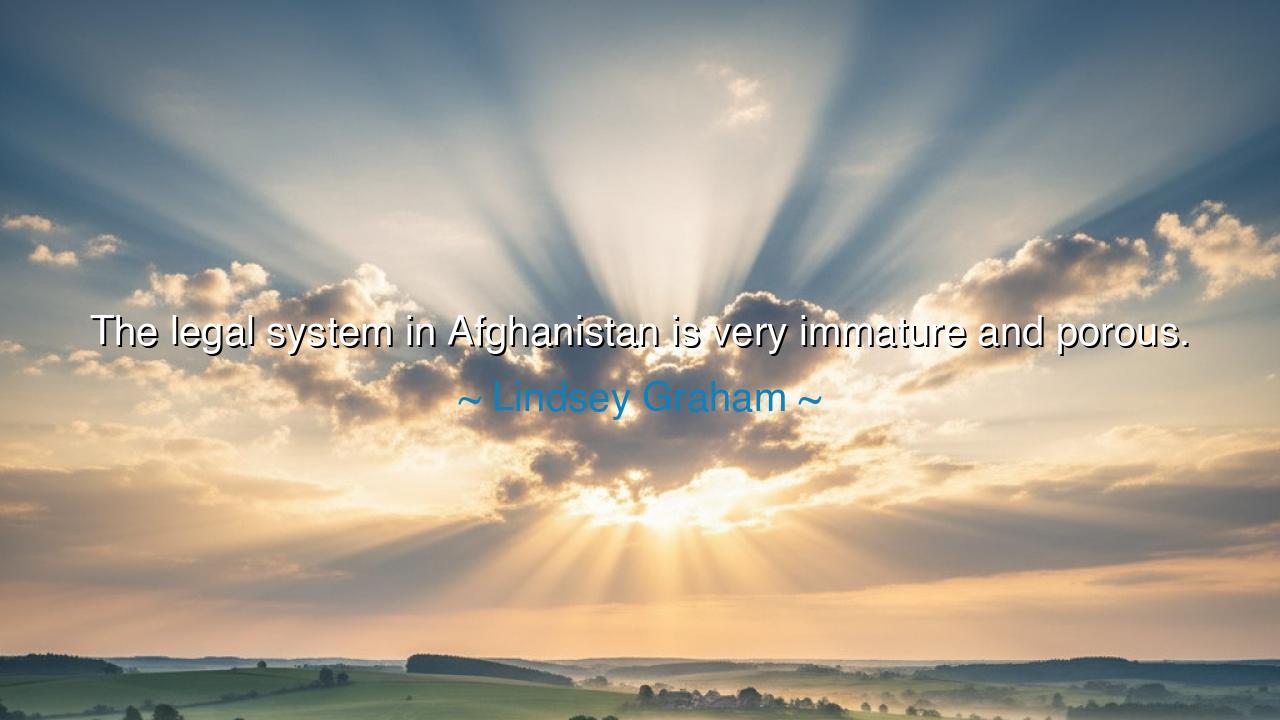
The legal system in Afghanistan is very immature and porous.






There are truths spoken in the language of diplomacy, and then there are truths that strike like iron against stone — cold, hard, and undeniable. When Lindsey Graham declared, “The legal system in Afghanistan is very immature and porous,” he was not merely describing a nation’s courts or its codes of law; he was diagnosing the deep wound of a society struggling to rise from the ashes of war. His words, simple yet grave, reveal a timeless principle: that justice is the foundation of civilization, and when that foundation is cracked, no army, no wealth, no alliance can hold the house together. For where law is weak, chaos grows strong; and where justice is uncertain, peace cannot endure.
The origin of this quote lies in the years following the U.S.-led intervention in Afghanistan, as the world sought to rebuild a nation fractured by decades of conflict. Senator Graham, a man trained in law and seasoned in governance, had seen firsthand the fragility of Afghanistan’s institutions. He knew that while armies could topple regimes, and treaties could draw new borders, true stability could not be imposed — it had to be grown. His assessment of an “immature and porous” legal system spoke not of contempt, but of sorrow and realism. Afghanistan’s courts, lacking in independence and consistency, were vulnerable to corruption, tribal influence, and political manipulation. In such an environment, law was not a shield for the weak, but a weapon for the powerful.
History has shown that the maturity of law is the maturity of a nation. In the ancient days of Babylon, King Hammurabi carved his code into stone so that no ruler, priest, or judge could twist justice to his will. “Let the strong not harm the weak,” the code declared — and with that, civilization took one of its first steps away from the wilderness. So too, in the wake of empire and war, Afghanistan sought to carve its own laws into the conscience of its people. Yet centuries of tribal custom, poverty, and foreign interference made this task nearly impossible. Without the roots of trust and education, the law became as porous as sand — allowing corruption to flow freely through its cracks, while the innocent found no firm ground to stand upon.
The ancient philosophers understood this peril well. Aristotle taught that the rule of law must be “reason free from passion.” But in lands torn by war, reason is often drowned by revenge, and justice is consumed by survival. Afghanistan’s legal system, like a sapling planted in rocky soil, could not yet bear the weight of fairness and order. Judges were threatened or bribed, police were underpaid, and ordinary citizens turned not to the courts, but to tribal elders or warlords for justice. This is what Graham meant by “immature” — not that the people lacked wisdom, but that the system lacked structure. And “porous” — not that the law did not exist, but that it was too easily penetrated by power, money, and fear.
To understand this more deeply, one need only recall the tragedy of Amina Lawal in another corner of the world — a woman in Nigeria once sentenced under flawed legal interpretation to death by stoning. Her salvation did not come from the system that judged her, but from the outcry of a global conscience. The law had failed, but justice was saved by the courage of compassion. Afghanistan, too, has seen such moments — when the law’s letter betrayed its spirit, and when foreign soldiers, Afghan reformers, and humble citizens alike struggled to rebuild a justice worthy of the name. Graham’s words echo the anguish of those who know that without righteous law, freedom decays into tyranny.
Yet his statement also holds a seed of hope. To call a system “immature” is to imply that it can grow. Every nation that stands tall today once stumbled as it learned to walk the road of justice. America itself, in its infancy, knew corruption, partiality, and inequality before its laws. It took centuries, and the sacrifice of countless souls, for its ideals to approach its promises. Afghanistan’s struggle, though grievous, is part of that same human story — the story of striving toward order, dignity, and fairness in the face of darkness. Graham’s words remind us that while nations may be reborn through war, they are sustained only through justice.
So let this truth endure, passed down as wisdom to future generations: no nation is truly strong until its laws are stronger than its rulers. The sword can conquer, but it cannot govern; only justice can build what violence destroys. If the law is immature, nurture it with education; if it is porous, fortify it with integrity; if it is unjust, remake it with compassion. For the health of a society is measured not by its armies or riches, but by how faithfully it guards the weak and restrains the powerful. Lindsey Graham’s warning, spoken of Afghanistan, resounds to all nations: that where law is fragile, liberty is fleeting — and only through the firm hand of justice can peace ever be made to last.






AAdministratorAdministrator
Welcome, honored guests. Please leave a comment, we will respond soon